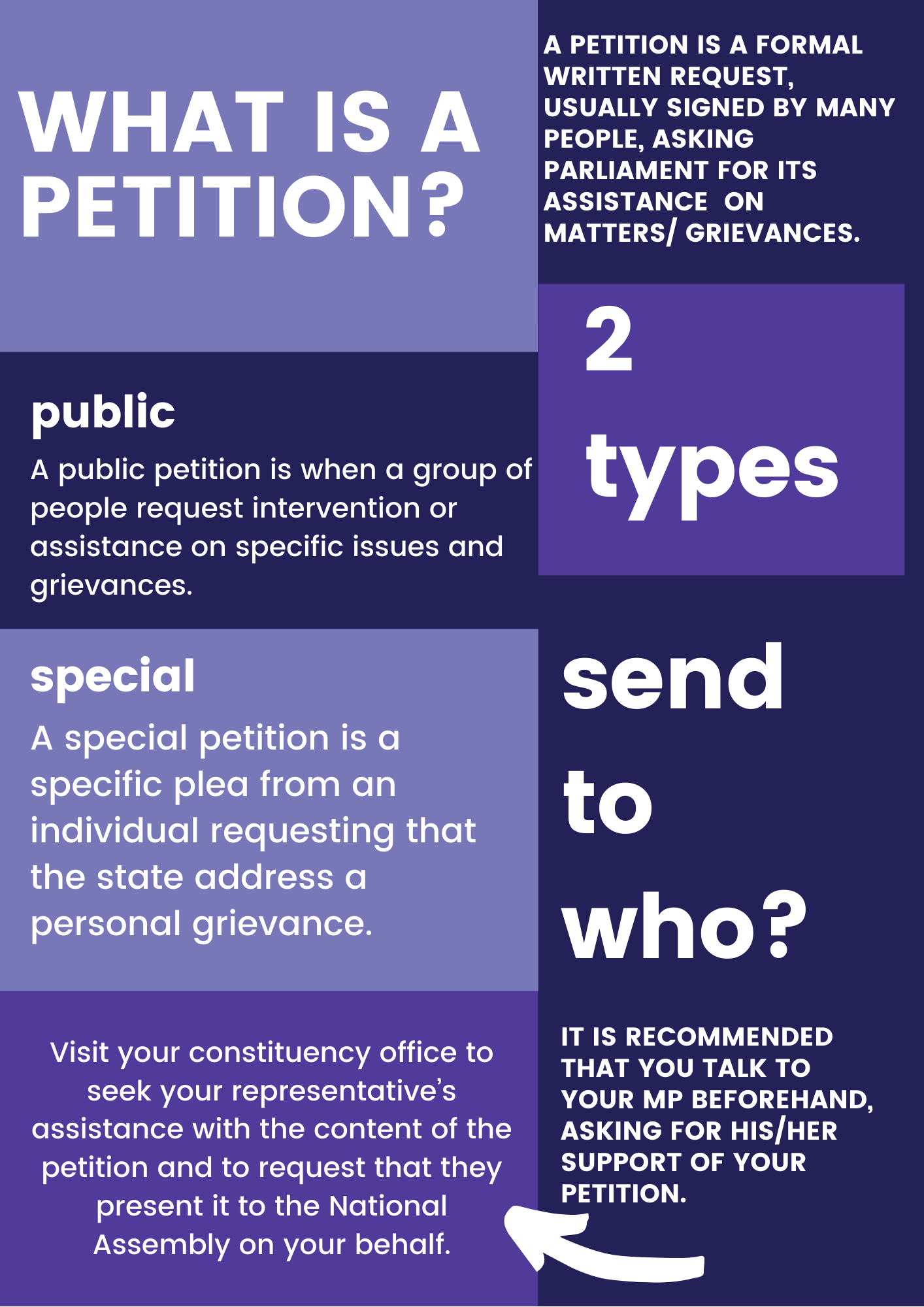
Public participation in law-making, oversight and other processes of Parliament forms an important part of our democracy.
Parliament has developed a number of ways to promote public involvement. One of these ways is by submitting a petition, and this is a right enshrined in section 17 of the Constitution. Although a petition is usually a last resort to seeking relief, it is an effective way of participating in the law-making process.
What is a petition?
Petitions allow members of the public to directly place their issues before the Parliament. A petition is a written complaint or request to Parliament or a provincial legislature seeking its intervention or assistance in a particular issue. Petitions are a last resort to seeking relief. A petitioner must first exhaust all available options. Most of the petitions relate to service delivery issues.
Two types of petitions
General / Public petition
A public petition is when a group of citizens with similar interests request general relief or redress of a grievance.
Special petition
A special petition is when an individual makes a specific request or asks for personal relief from the State, which is not authorised by law, such as access to a pension.
How is a petition presented on your behalf in Parliament?
National Assembly process:
In the National Assembly, a Member of Parliament (MP) must formally present the petition on your behalf to the Speaker of the National Assembly. You therefore need to contact an MP to request their support and assistance with your petition. You can use our Write-To-MP tool and Replocator tool to locate any MP.
Here is an example of a petition that National Assembly MP Haseena Ismail supported on behalf of members of her constituency area in Benoni, Johannesburg.
National Council of Provinces process:
A petition to the NCOP does not require the support of an MP, however the petition should be in line with the NCOP rules.
If the petition complies with all the requirements, it will be tabled in the relevant House and referred to the relevant Committee for consideration and report. In the National Assembly, petitions can be referred to any committee while there is a dedicated committee in the NCOP to process petitions. Committees must ensure that appropriate action is taken in respect of each petition accepted by Parliament and ensure the resolution of each petition.
Petitioners can choose whether to make a submission via the National Assembly or NCOP.
Challenges with the petitioning process:
Several challenges have been identified with the petitioning process. The NCOP Select Committee on Petitions and Executive Undertakings highlighted the following challenges at the end of the Fifth Parliament.
The public has little awareness of the mandate of the Committee and the petitions process at Parliament;
Majority of petitions submitted to Parliament in the Fifth Parliament did not qualify as petitions and were not properly vetted prior to their referral to the Committee;
There is limited or no interaction with the petitions committees at provincial and local government level;
There were delays and difficulties in carrying out the mandate of the Committee due to the absence of rules or guidelines that guide the Committee;
There was non-attendance of key stakeholders during hearings on petitions, in particular provincial and national government departments; Changes in the NCOP Parliamentary Programme affected the ability of the Committee to stick to its approved programme;
There was limited time allocated to the Committee in order for it to consider petitions and scrutinise the implementation of executive undertakings; and Limited or no capacity building for staff and MPs to enable them to effectively execute the dual mandate of the Committee.
If you would like to enquire on petitions, call or write to the Clerk of Papers on the below details, or alternatively visit the Parliament website: Tel: (021) 403-2224/6 P.O.Box 15, Cape Town, 8000.